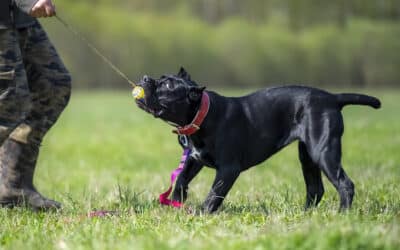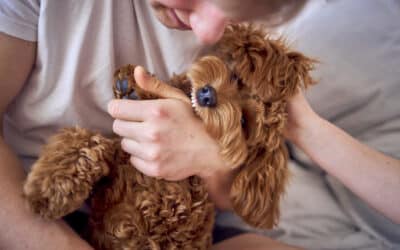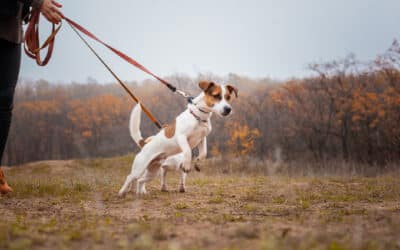Think back to your first day of high school. The excitement, the nervousness, and the overwhelming feeling of stepping into a whole new world. That’s what your puppy goes through whenever they experience something new. If they are ill-prepared, nervousness may overshadow the excitement and overwhelm them. Socializing your puppy under expert guidance as early as possible will set them up for a happy future!
Socializing doesn’t mean taking your puppy to the dog park (in fact, that can often end badly with a young puppy). Just like us, puppies need to learn how to navigate the world around them. Socializing your puppy is an essential aspect of puppy training. It teaches them that dogs, people, noises, and even surfaces are all normal parts of life.
In this article, we’ll share six tips for socializing your puppy and set them up for a lifetime of confidence and trust. Before we dive into the tips, let’s talk about what good dog socialization looks like. That way, you’ll know what to watch for as your puppy continues to grow.
What is Good Dog Socialization?
Have you ever wondered why some dogs can coexist peacefully with cats while others cannot stand the sight of them? It’s because of early exposure. That’s why it’s important to expose your puppy to different kinds of people, such as children and elderly people, and animals like other dogs, cats and birds. The goal of this training is to show your puppy that these things are normal and should be ignored in favor of focusing on you!
Remember that dogs have innate instincts. Their first reaction to new people and animals might be to bark, chase, or even bite. You must try to view these interactions from your dog’s perspective. Understand that a smaller animal running away might trigger their prey drive. Or a car driving past might trigger their chasing instinct. Socializing your puppy and building a connection together from day one will help keep those instincts in check!
For example, during a walk in your neighborhood, you encounter a person jogging, a cyclist, and another dog being walked on a leash. A well-socialized puppy would calmly observe these elements without showing fear or reactivity. They would follow the owner’s lead as to whether to approach or pass by these everyday things.
This successful interaction results from consistent exposure to various experiences, teaching them that such encounters are a normal part of life and not a threat and that you will keep them safe.
Keep Your Puppy Safe
Before you start socializing your puppy, always consider their safety. You don’t want to expose them to situations where they could get injured or emotionally scarred.
No matter how “chill” your puppy might seem, they can get spooked easily when they bump into something new. When you’re taking them near busy roads or up high, get a good grip on the leash and double-check that their collar or harness won’t slip off their cute little head.
The world can be a big, scary place for a tiny puppy. They might just need a superhero to help introduce them to new situations or environments. So, put on your cape and follow these tips on how to get the most out of the socialization process:
Lead by Example when socializing your puppy
Like a mini sidekick, your puppy will learn from watching you. When introducing them to new situations, stay calm and confident. If you’re as cool as a cucumber, your pup will notice and feel more at ease. Show them there’s nothing to fear and that the world is full of exciting adventures waiting to be discovered.
If you’re nervous or stressed, your pup will pick up on these emotions and may become anxious or fearful as well. For instance, don’t respond with aggression or fear if another dog starts barking at your puppy. Remain calm and show your pup there’s no reason to be scared, and everything will be okay.
Having a chat with the scary thing also seems to work wonders. Don’t be shy. Approach that spooky object and strike up a conversation with it. Say something like, “Wow, what an amazing vacuum cleaner you are! Who’s a good (but noisy) vacuum cleaner?” Sure, it might feel a bit silly, but trust us, your pup won’t judge you or make fun of you, we promise!
If it’s a person, chat with them while both of you casually ignore your puppy. Before you know it, your curious pup will want to join in on the interaction too!
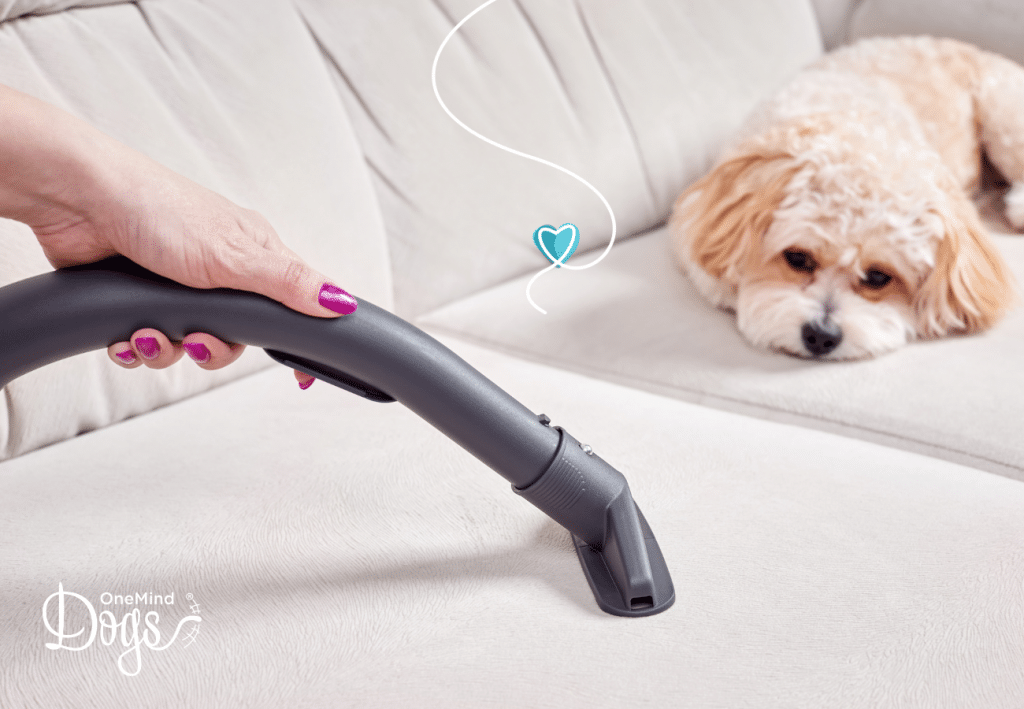
Start from a Distance
When your dog seems worried or unsure about something new, let them observe from a safe distance first. You’ll recognize a confident dog when they look relaxed, with a loose body and wagging tail. If your pup shows signs of stress (panting, lip licking, or cowering), give them space and move back until they become more at ease. Socializing your puppy takes time, be patient!
Take the first trip to the dog park, for instance. You definitely shouldn’t dump them in the enclosure and expect them to go wild. Instead, stand with your pup near the fence and let them observe other dogs playing in the distance. Once they seem more relaxed, you can take a few more steps closer until they’re comfortable enough to go inside. Some dogs may never want to play with other dogs at a dog park, and that’s ok too! Make sure you watch your dog and adapt to their needs, don’t force anything!
This gradual exposure helps them get used to being around other dogs in a safe and controlled environment. You can repeat this for everything that seems scary to them, including when you:
- Have visitors over with different appearances (e.g., wearing hats or glasses)
- Introduce your puppy to various household items (e.g., dishwashers, vacuums)
- Expose them to different types of flooring (e.g., sand, carpet, hardwood)
- Take them on walks to different places and get them used to noises (e.g., crowds, traffic)
- Let them meet friendly and calm dogs from different breeds
Besides starting from a distance, you should also start socialization training early on in your pup’s life. The critical window for socialization is between 3 and 14 weeks old. According to the American Veterinary Society of Animal Behavior (AVSAB), puppies should be exposed to as many new experiences as possible during this crucial period.
During this time, puppies are more receptive to new experiences and will be less fearful of them later in life. Think of this period as moldable clay, ready to be shaped into the perfect sculpture of a well-socialized dog.
Test with Food or a Favorite Toy
This tip is twofold. First, food and toys are great for reinforcement and rewards when socializing your puppy. Imagine meeting someone who always brings you your favorite snack – you’d probably look forward to seeing them again! The same principle applies to your puppy. Reward your pup with treats, praise, or playtime when they successfully navigate new encounters.
If you’re trying to familiarize your pup with car rides, bring along their favorite treat or toy. Reward them with a treat or engage in playtime while in the car (as long as you’re a passenger), helping them associate the experience with positive feelings. Over time, your puppy will learn to associate car rides with those happy memories, turning a potentially stressful situation into an enjoyable adventure.
When introducing your puppy to a new person, let the puppy set the pace, if they don’t offer to approach the person, don’t make them. When they do choose to approach, you can reward them with praise and a treat. This helps your pup understand that meeting new people is a pleasant and rewarding experience. Similarly, when acclimating your puppy to new sounds or environments, provide encouragement and rewards to make the situation enjoyable and stress-free.
Next, you can offer your puppy something comforting when introducing them to new experiences as a way to gauge their emotional state. Dogs often refuse to eat or play when scared or anxious. If they accept the food or engage in play, it’s a sign that they feel more at ease.
Progress at Your Dog’s Pace
Every pup is unique – some may be fearless explorers, while others are more cautious adventurers. Be patient as your puppy navigates the socialization journey at their own pace. Pay attention to their progress and adapt your approach accordingly. If they need more time to embrace a particular situation, don’t push them too hard. Instead, let them build up their confidence one step at a time.
- Start Slow: Fostering a confident adult dog requires a gentle introduction to various experiences and locations. If you throw everything at your pup all at once, it will likely overwhelm them and cause fear.
- Start Easy: Begin with low-stress settings, like letting your puppy explore your backyard or a quiet park. Allow them to interact with different textures, such as grass, leaves, or sand. As they gain confidence, they can venture into more dynamic environments, like bustling outdoor markets or busy pedestrian areas.
- Start Short: Initially, limit the duration of these outings to avoid overwhelming your puppy with excessive stimulation. As they become more comfortable, you can gradually increase the time spent in these situations.
- Always Reward: Encourage your pup to explore an area and praise them for their bravery. Once they’ve mastered that, gradually introduce them to others, always reinforcing their progress. Celebrate their achievements, no matter how small, and help them understand that trying new things can lead to great rewards.
Check Your Own Feelings
Finally, dog owners must always be aware of their own emotions during the socialization process. Your puppy is highly attuned to your feelings, and your mood can significantly impact their experience. If you’re feeling frustrated, stressed or impatient, don’t let it show. Take a break and revisit the situation later with a fresh mindset. The more relaxed and positive you are, the better your puppy’s socialization experience will be.
Consider seeking advice from professional trainers if you struggle to stay patient and confident in training sessions.
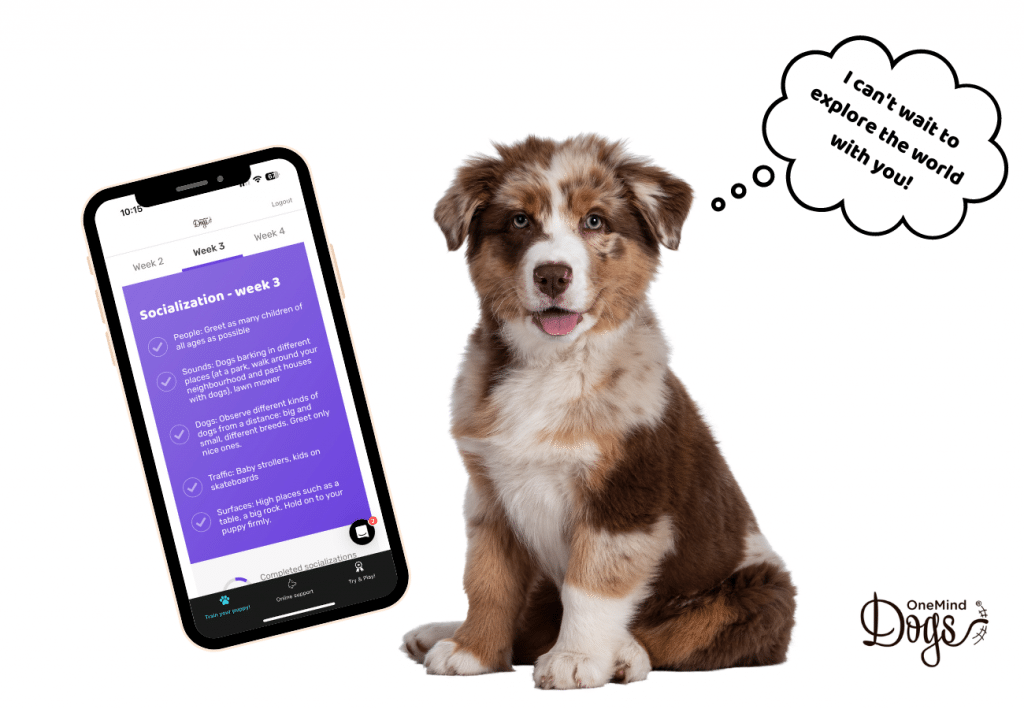
Learn Socialization with Our Online Puppy Training with OneMind Dogs
At OneMind Dogs, our online puppy training platform specifically addresses the importance of socialization, along with teaching other essential skills. Through our engaging video lessons, interactive activities, and expert advice, we help you and your puppy navigate the socialization process together.
Our online training program dives into all sorts of socialization aspects, like introducing your puppy to an awesome mix of people, animals, and environments. Stick with our guidance, and you’ll create paws-itive experiences for your pup during this crucial developmental stage.
Besides socialization, we’ll also guide you through foundation agility training, leash-walking techniques, and super helpful strategies to tackle common behavior challenges. With OneMind Dogs as your trusty partner in puppy training, you’ll be all set to lay down a solid foundation that leads to a well-adjusted adult dog.

